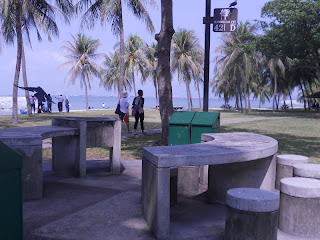Field inquiry on coastal studies
Our first activity at the East coast park was to label the low water mark, the high water mark, the shoreline and the coastline.
The East Coast Park is bustling with activities and can be very crowded during the weekends. Luckily we are there on a weekday. We show people camping, jogging, cycling and a group of students who are ready to start their BBQ. We did interviews with the people and learned quite a bit.
This was our findings which we presented at the post fieldwork session.
We then proceeded to our assigned area, cell G. The breakers here are higher and nearer to each other. We observed the symmetrical shape of the coastline so we came up with the hypothesis that the beach gradient should also be the same on both sides behind the breakers. However, after measuring the gradient, we realised that the gradient is steepest at the one on the West compared to the one facing the East. We suspected that the more gentle slope could be a results of the longshore drift. We threw an apple into the sea and the swash brought the apple up the shore and the backwash brought it back to the sea causing the apple to move from west to east. However, it took a long time for the apple to move eastwards. We also timed the no. of waves per min - 20 per min which showed that the waves are strong and destructive. Thus the breakwater was quite effective - the coast which is actually reclaimed land would have given way to erosion if the coastal protection was not introduced.
Using the downloaded application clinometer, we measured the gradient at every 1m interval from the high water mark with the tablet. Amazing what technology can do as in the past we have to carry the ranging poles and the clinometer to measure the beach gradient in order to plot the beach profile. When I downloaded the free app clinometer and smart compass from the Android Market , I also saw the 3D earthquake app which was so amazing - the next good app after google map!
The sketch which I did at the area we were assigned.
The East Coast Park is bustling with activities and can be very crowded during the weekends. Luckily we are there on a weekday. We show people camping, jogging, cycling and a group of students who are ready to start their BBQ. We did interviews with the people and learned quite a bit.
This was our findings which we presented at the post fieldwork session.














.JPG)
0 Response to "Field inquiry on coastal studies"
Post a Comment